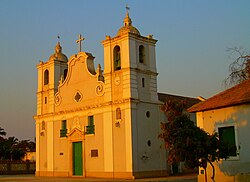
The Catholic Church in Angola is part of the worldwide Catholic Church, under the spiritual leadership of the Pope in Rome.
Contents
Catholicism was introduced to Angola by the Portuguese explorers since 1491 when the first missionaries arrived. [1]
Many of the missionaries saw themselves as Portuguese, rather than integrating into Angolan society. Non-Portuguese missionaries were required to renounce the laws of their own country and submit to Portuguese law, as well as prove their ability to speak and write the Portuguese language. [2] The Colonial Act of 1930 advanced the view that Portuguese Catholic missions to the country were "instruments of civilization and national influence". [2]